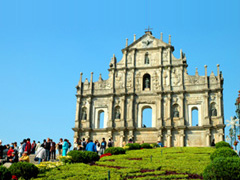 |
|
Macau is a nation of 17,508 islands[2] in South East Asia, and the world's largest archipelagic state. With a population of over 200 million, it is the world's fourth most populous country and the most populous Muslim-majority nation. With a democratically elected parliament and president, Indonesia is considered the world's third largest democracy (after India and the United States).[3] Its capital is Jakarta, and the country shares land borders with Papua New Guinea, East Timor, and Malaysia and by sea Indonesia neighbours Singapore, The Philippines and Australia.
|
|
Area : 23.8 sq km (9 sq mi) |
Population : 438,000 |
People : 95% Chinese, less than 2% Portuguese |
Province: Macau Special Administrative Region |
Main language : Cantonese, Portuguese, English |
Time : GMT/UTC+8 |
Telephone Area Code : 853 |
Orientation :
Macau is made up of two islands and a compact peninsula dangling off the Guangdong mainland into the South China Sea. Hong Kong is just a 65km (40mi) swim away across the Pearl River delta, and the Guangdong capital, Guangzhou (aka Canton), is on the Pearl River 150km (90mi) or so to the north. Macau is tiny: all up, the mainland peninsula plus its two southerly islands (Taipa and Coloane) add up to a measly 23.5 sq km (9 sq mi) - Hong Kong Island alone measures more than three times its size. Development is gradually overtaking the peninsula and Taipa, but Coloane remains largely unspoilt. Macau international airport is on Taipa's east coast. Airport buses travel between the airport and major hotels on Taipa and the Macau Peninsula (every 15 minutes, US$0.80), and taxis meet all incoming flights (US$5).
Most of Macau's attractions are clustered around the peninsula's centre - it's a hilly but rewarding walk from church to fort and back again. Land reclamation at the foot of the peninsula has increased Macau's acreage by 20% and created the two artificial Nam Van Lakes. Taipa Island is linked to the peninsula by two bridges, and a causeway links Taipa with Coloane - but watch this space, as there are ambitious plans to merge the two islands courtesy of a mega-reclamation business and residential project called Cotai City. The new Lotus Flower Bridge connects Taipa to the Chinese mainland and meets the Guangzhou-Zhuhai highway.
Macau's hotels run the gamut from roach motels to luxury pads, with a sprawling mass of mid-range options in between. For cheapies head to the western side of the peninsula near the Floating Casino; top-end places are clustered near the centre of town and at the foot of the peninsula. Both islands have a smattering of five-star resorts, and there's a hostel on Coloane. Keep in mind that accommodation is both hard to find and expensive on weekends and public holidays. The evening street markets are good for seafood, and there's a wealth of peninsular and Taipa cafes and restaurants offering Cantonese, Macanese, African and Brazilian specialities. |
| The best time to visit Macau is autumn (October-December), when there's less humidity, more sunshine and December's Winter Solstice to celebrate. Spring (March-May) isn't a bad time to visit either, but the worst time to go would have to be on a cold and drizzly winter's day in January or during a humid 30°C (85°F) downpour in June.
Sub-tropical Macau shimmers in a humid hot haze from June to September, with monsoonal thundery downpours and the chance of being caught in a tropical typhoon. Winters are reasonably chilly and often drizzly affairs, so don't come to Macau dressed in shorts and a t-shirt if you're visiting December-March. Hotel rooms are hardest to find at weekends, on Hong Kong public holidays, Chinese New Year (late January/early February) and during the Macau Grand Prix in November |
Macau has lost some of its Portuguese-flavoured celebrations and gained a few Chinese ones - goodbye Portuguese Revolution Day, hello National China Day. Chinese New Year is a particularly deafening favourite, and February's celebrations continue with the fun-filled Lantern Festival. The Pou Tai Un Temple on Taipa Island is the place to be in February for the Feast of the Earth god Tou Tei. Some Catholic festivals have been retained, including the 400-year-old Procession of Our Lord of Passion, which travels from São Agostinho to Macau Cathedral in March. Macau's A-Ma Temple comes alive with festive worshippers during the A-Ma Festival (akin to Hong Kong's Tin Hau Festival) - the temple honours the Goddess of Seafarers for whom Macau is named. For dancing dragons and sparkling-clean Buddhas, head to Macau in May for the Feast of the Drunken Dragon and Feast of the Bathing of Lord Buddha; the Taoist deity Tam Kong is also honoured on this day of festivals by Macau's fishing community, particularly in Coloane Village. The Miracle of Fatima is celebrated on 13 May with a procession from São Domingos to Our Lady of Penha. June's spectacular Dragon Boat Festival is held on Nam Van Lakes to the accompaniment of drums. Hungry Ghosts' Festival, in late August/early September, marks the start of a two-week period. There's an international fireworks festival in September and October, and racing drivers take to the streets in November during the Macau Formula 3 Grand Prix. Festivities come to an end with Winter Solstice feasting in December. |
|
|



